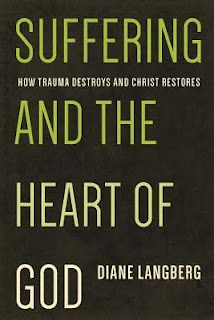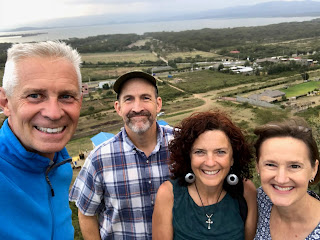In the last week, cancer has sent shock waves through some lives close to ours. One of our team leaders learned their father has a very aggressive brain tumor with a median survival just over a year. Our former Bundibugyo team leader, Travis, learned that the immunotherapy trial he has been on this year is no longer helping him; his metastatic tumors are growing. He's already beat some serious odds surviving over 5 years since his diagnosis, but this news was a sobering blow to him, his young family (he got cancer in his 30s), and all of us. A dear friend and supporter (our age) learned this week that she has ovarian cancer, and it has already spread across her abdomen. Two of our Serge founders' grandchildren, young 30-40 year olds, died of cancer within a week of each other in September. That's 2 deaths, 2 new diagnoses, and 1 treatment-no-longer-working, all in people from their 30s to 60s, all Serge-associated in some way (2 of them are on our board), all in the last week to ten days. That gets our attention. These are five people who have loved well and lived well and for whom, it would make sense to us, the balance of good would benefit from keeping them all on earth for many more decades.
It's not that we should be so surprised, suffering is all around us, every day. Perhaps the suffering that is part and parcel of our hours tends to be more palpable and fightable. Surely we can infuse the right antibiotic, fix the oxygen supply, counsel with the right words, lance the boil, perform the surgery, raise the funds, that engages evil and changes the outcome. But cancer doesn't work that way. It is a brokenness insidious and hidden and pervasive and costly.
It's not that we should be so surprised, suffering is all around us, every day. Perhaps the suffering that is part and parcel of our hours tends to be more palpable and fightable. Surely we can infuse the right antibiotic, fix the oxygen supply, counsel with the right words, lance the boil, perform the surgery, raise the funds, that engages evil and changes the outcome. But cancer doesn't work that way. It is a brokenness insidious and hidden and pervasive and costly.
So here are two books to recommend. The first, I read this weekend. Kate Bowler is a Duke Divinity school professor and another 35-year old upended by cancer. This is a personal account, funny and raw and reflective and brutally honest. It is not a treatise on theodicy, it is her story (which is mostly how the Bible writes about God and suffering too). She grapples with the loss of control, and learning to live in the now. She grieves the sorrows loudly and she holds onto the good. But mostly she tells us the only true thing: in the worst moment of her life, she knows God is love. There are two appendices: what not to say, and how to be helpful.
The second book is equally profound. Langberg writes from her lifetime experience as a counselor specializing in trauma, particularly sexual abuse, about the way evil wounds us and how we as a church and community can respond. This book is more of a text, with illustrative vignettes but not a narrative. Her solid affirmation of a theology of suffering rings true, and her wisdom in walking alongside the sufferers is clearly and carefully laid out. In a week where not only fatal diagnoses abounded, but the trauma of sexual abuse of power was powerfully and articulately personified by Dr. Ford as millions watched the senate confirmation hearings, Langberg's book is one I would like to return to.
Neither book purports to have all the answers, which is appropriate for people who are supposedly centered on something like a cross. Mysteriously, God does not end cancer or abuse or war or the sadness of missing our families. Not yet. Instead we are plunged into this unpredictable story which arcs towards good, but passes through a thousand dark valleys on the way. We follow Jesus, who did not crush the Romans or raise every widow's prematurely dead son, but walked straight into unimaginable suffering as the means of introducing a quiet and slow redemption. Immediate incontrovertible victory sounds good, but that's not what God usually does, which is why we are still here on this earth. Kate, and Travis, and others, will probably not have their cancers disappear, but they will experience the Mercy and show us how to walk with courage on a path of love that gives space for all 7 billion of us to find God's love. Which is a miracle. And we can walk with them as friends who pray, and care, and cheer, and weep.
Let me close with one of our songs from church today: New Wine, by Hillsong. In the crushing, there is new wine pouring out. It sounds poetic until you are the one being crushed, but it is an image of Jesus and a prayer of faith all the same.





















